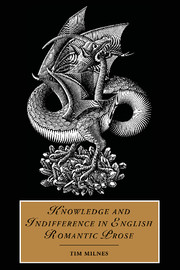Book contents
- Frontmatter
- Contents
- Acknowledgements
- Introduction: Romanticism's knowing ways
- 1 From artistic to epistemic creation: the eighteenth century
- 2 The charm of logic: Wordsworth's prose
- 3 The dry romance: Hazlitt's immanent idealism
- 4 Coleridge and the new foundationalism
- 5 The end of knowledge: Coleridge and theosophy
- Conclusion: life without knowledge
- Notes
- Bibliography
- Index
- CAMBRIDGE STUDIES IN ROMANTICISM
Conclusion: life without knowledge
Published online by Cambridge University Press: 22 September 2009
- Frontmatter
- Contents
- Acknowledgements
- Introduction: Romanticism's knowing ways
- 1 From artistic to epistemic creation: the eighteenth century
- 2 The charm of logic: Wordsworth's prose
- 3 The dry romance: Hazlitt's immanent idealism
- 4 Coleridge and the new foundationalism
- 5 The end of knowledge: Coleridge and theosophy
- Conclusion: life without knowledge
- Notes
- Bibliography
- Index
- CAMBRIDGE STUDIES IN ROMANTICISM
Summary
While we are reasoning concerning life, life is gone […].
David Hume, ‘The Sceptic’When he urged every enlightened reader to commit to the flames those volumes of ‘sophistry and illusion’ which contained neither abstract nor experimental reasoning, Hume was aware that such an injunction would precipitate the division of value from fact, of what mattered deeply to us from what could be known by us. Henceforth, the choice confronting speculative minds would not so much concern the nature of the philosophy they followed, as whether philosophy itself was to be preferred over ‘life’, or the domain of experience which lay outwith Hume's forked epistemology. Indeed, it seemed to many that epistemology had only itself to blame for its predicament. Philosophy in general, as Lamb observed of the ‘Humeian’ in particular, had become inhuman. If it was to overcome its own sceptical alienation from value, the question which philosophy faced was: must knowledge know itself completely in order to count as knowledge? Looked at from a slightly different perspective, this question becomes: would such absolute knowledge even be knowledge? This eighteenth and early nineteenth-century problem is the converse of that perennial paradox of late twentieth-century theory and historicism, much of which assumes an epistemic grounding through the very process of never permitting that ground to settle. While the modern critique silently attests to its unconditioned consciousness through its ceaseless examination of its own contingent conditions, the ‘knowledge’ of epistemology ultimately aspires to groundlessness; which is to say, a condition beyond itself, life, in which the dualism of knower and known, thought and being, is annulled.
- Type
- Chapter
- Information
- Knowledge and Indifference in English Romantic Prose , pp. 209 - 215Publisher: Cambridge University PressPrint publication year: 2003



